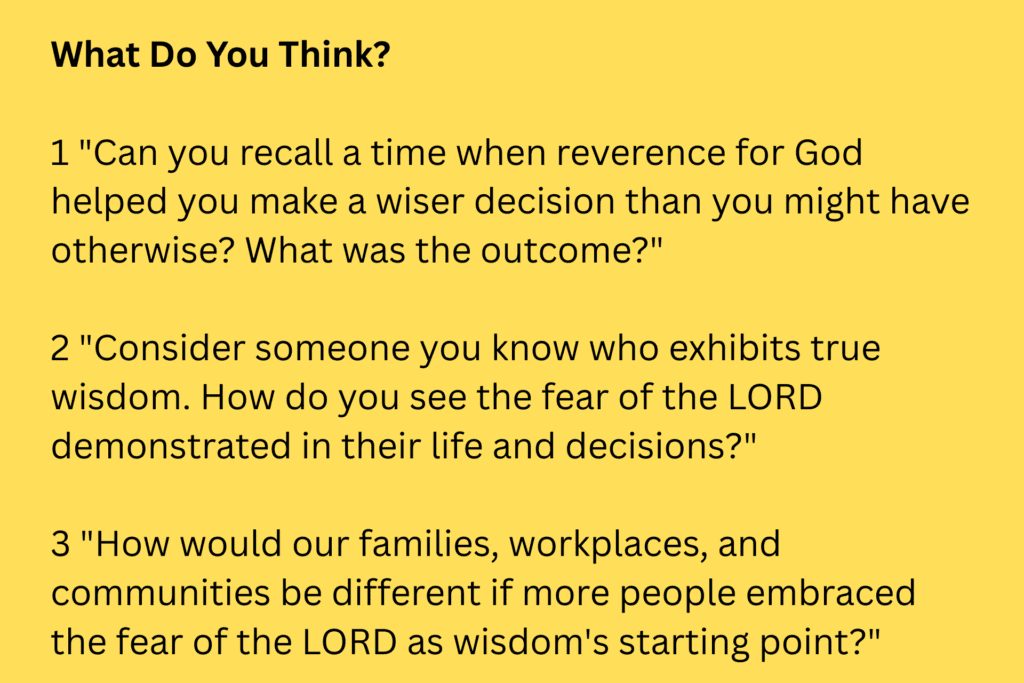In a world that celebrates self-sufficiency and individual autonomy, the biblical concept of “fearing God” can seem outdated or even troubling. Yet Scripture boldly declares that “the fear of the LORD is the beginning of wisdom” (Proverbs 9:10). What if this ancient wisdom holds the key to navigating our complex modern lives? Today, we’ll explore how developing a proper reverence for God might be exactly what our disoriented world needs most.
Understanding Biblical Fear
When the Bible speaks of “the fear of the LORD,” it’s not describing terror or anxiety. Rather, it refers to a profound reverence, awe, and respect for God’s power, holiness, and authority. The Hebrew word yirah used in Proverbs encompasses this rich meaning—a reverent awe that leads to obedience and worship.
This fear acknowledges God’s transcendence and our proper relationship to Him. As the psalmist wrote, “Let all the earth fear the LORD; let all the inhabitants of the world stand in awe of him!” (Psalm 33:8). This reverence positions us correctly before God—as creatures before Creator, servants before Master, children before Father.
When we approach God with this proper reverence, we’re prepared to receive wisdom. After all, wisdom begins with accurately understanding reality, and no reality is more fundamental than recognizing who God is and who we are in relation to Him.
Embracing Our Limitations
True wisdom begins with humility—recognizing our intellectual and moral limitations. The fear of the LORD cultivates this humility as we encounter God’s infinite wisdom compared to our finite understanding.
Scripture reminds us, “Trust in the LORD with all your heart, and do not lean on your own understanding” (Proverbs 3:5). This isn’t a call to abandon reason but to recognize its boundaries. Even the wisest human reasoning is limited, but God’s wisdom is perfect and complete.
Job discovered this truth through personal experience. After questioning God’s ways, he encountered the Lord directly and confessed, “I have uttered what I did not understand, things too wonderful for me, which I did not know” (Job 42:3). This awareness of our limitations—inspired by encountering God’s greatness—creates the space where true wisdom can grow.
Connecting to the Source of Wisdom
If God is the ultimate source of wisdom, then revering Him connects us directly to that source. As James 1:5 promises, “If any of you lacks wisdom, let him ask God, who gives generously to all without reproach, and it will be given him.”
Scripture repeatedly identifies God as wisdom’s origin: “For the LORD gives wisdom; from his mouth come knowledge and understanding” (Proverbs 2:6). When we fear God, we naturally turn to Him for guidance and insight. Just as we might seek advice from someone we deeply respect, our reverence for God positions us to receive divine wisdom.

This connection is not merely intellectual but relational. Jesus taught that abiding in Him—maintaining a living relationship—is essential for bearing fruit (John 15:4-5). The fear of the LORD nurtures this vital connection to wisdom’s source.
Developing Moral Clarity
Wisdom isn’t merely accumulating knowledge—it’s applying knowledge properly to navigate life’s complexities. The fear of the LORD provides the moral clarity essential for wise living.
As Psalm 111:10 states, “The fear of the LORD is the beginning of wisdom; all those who practice it have a good understanding.” Notice the emphasis on practice—wisdom manifests in our choices and actions, not just our thoughts.
Reverent fear establishes clear moral boundaries. When we recognize God’s holiness and authority, we’re more inclined to distinguish between right and wrong, wise and foolish, beneficial and harmful. This discernment is wisdom’s practical expression.
King Solomon exemplifies this connection. After humbly acknowledging his inadequacy before God, he requested “an understanding mind to govern your people, that I may discern between good and evil” (1 Kings 3:9). God granted his request precisely because Solomon’s fear of the LORD led him to seek moral discernment.
Gaining Eternal Perspective
Perhaps most importantly, the fear of the LORD gives us perspective that extends beyond our immediate circumstances. Wisdom requires evaluating choices not just by their immediate consequences but by their ultimate outcomes.
When we fear God, we become aware of eternal realities. As Jesus asked, “For what will it profit a man if he gains the whole world, but loses his soul?” (Mark 8:36). This eternal perspective is essential for wise decision-making.
Ecclesiastes concludes its exploration of meaning with this insight: “The end of the matter; all has been heard. Fear God and keep his commandments, for this is the whole duty of man. For God will bring every deed into judgment” (Ecclesiastes 12:13-14). This awareness of divine judgment doesn’t paralyze us with dread but rather focuses our attention on what truly matters.
Conclusion: Wisdom’s Invitation
As we’ve explored the profound connection between fearing God and gaining wisdom, we stand at a crossroads. The world offers countless paths to what it calls wisdom—advanced degrees, self-improvement techniques, philosophical systems, and accumulated experiences. Yet Scripture points to a different starting point altogether: reverential awe before our Creator.
This fear of the LORD isn’t a destination but a beginning—the foundation upon which true wisdom is built. When we approach God with humble hearts and proper reverence, acknowledging His holiness and our dependence, we position ourselves to receive insight that transcends human understanding.
The invitation stands before each of us today. Will we trust in our limited perspective, or will we embrace the fear of the LORD that opens the door to divine wisdom? Will we navigate life’s complexities through our own reasoning alone, or will we seek the guidance of the One who designed both us and the world we inhabit?
Perhaps true wisdom begins not with confidence in what we know, but with the humility to recognize what we don’t know—and the reverent fear that drives us to the Source of all wisdom.
As you reflect on your own journey, consider where you stand. Has the fear of the LORD been your foundation, or have you been building on something else? The good news is that God’s invitation to wisdom remains open to all who would approach Him with reverent hearts.
“The fear of the LORD is the beginning of wisdom, and knowledge of the Holy One is understanding.” (Proverbs 9:10)

***


Here are links to my blog indexes, which will make it quick and easy for you to find another post to read.
∙ Blogs with a Spiritual Theme
∙ Blogs about Books I Like: Fiction
∙ Blogs about Books I Like: Nonfiction
∙ Blogs for Holidays and Other Special Days
∙ Miscellaneous Blogs
